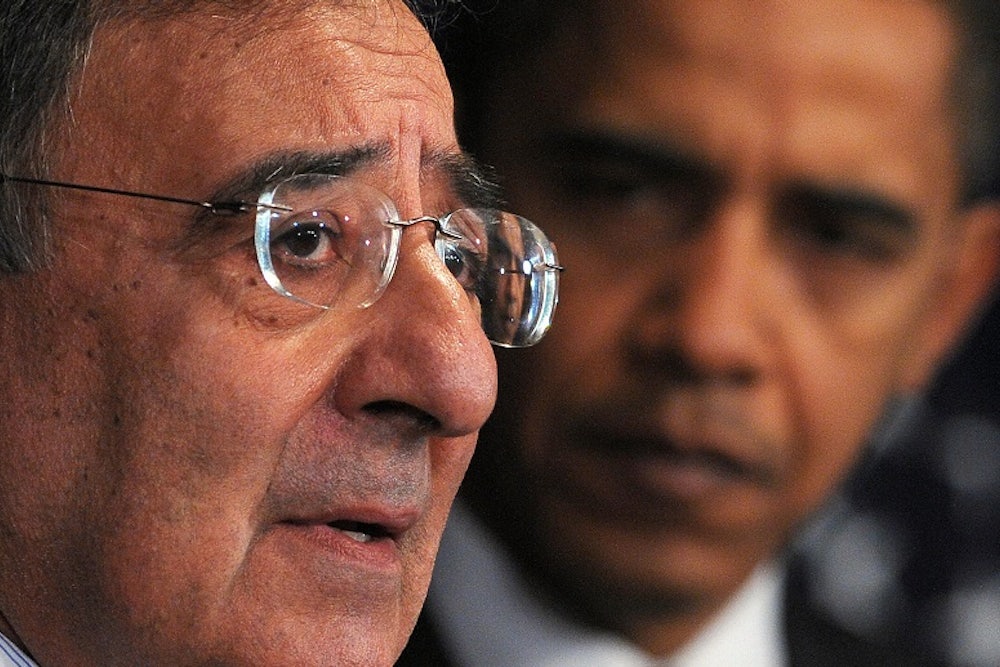On Tuesday, former Defense Secretary Leon Panetta released a memoir on his time in the Obama administration. In it, he criticizes the president for not leaving troops in Iraq after 2011, not arming the moderate Syrian rebels sooner and not going to Congress for authorization to use force in Iraq and Syria against the Islamic State. The White House will undoubtedly dispute those points, but fair enough. What's not remotely fair, though, is that Panetta blames Obama—rather than Republicans—for the defense cuts in the sequester.
The New York Times' Peter Baker describes Panetta’s anger over the issue:
For Mr. Panetta, the moment that crystallized his frustration with Mr. Obama came when the president made little effort to stop deep automatic budget cuts mandated by the sequester.
“Indeed, that episode highlighted what I regard as his most conspicuous weakness, a frustrating reticence to engage his opponents and rally support for his cause,” Mr. Panetta wrote. “That is not a failing of ideas or of intellect,” he added. “He does, however, sometimes lack fire. Too often, in my view, the president relies on the logic of a law professor rather than the passion of a leader.”
Panetta isn’t the only one to argue that Obama’s lack of leadership is responsible for the cuts to defense. During the 2012 presidential election, Mitt Romney blamed Obama for the impending defense cuts. Senator John McCain did, too. In order to believe Panetta’s view, though, you'd have to ignore the entire legislative history of the sequester—along with the Obama administration’s attempt to undo it.
Back in 2011, Republicans were holding the debt-ceiling hostage unless they received significant spending cuts in return. As the government inched closer to a default—and the catastrophic economic consequences that would follow—Republicans finally relented, but only under the condition that a bipartisan supercommittee would be formed to create a deficit-reduction plan of $1.2 trillion.1 If the committee failed, across-the-board cuts to both defense and non-defense spending would be triggered: sequestration. Policymakers hoped this would incentivize both parties to reach a deal. In the end, McCain, Mitch McConnell, John Boehner, Paul Ryan and a host of other Republicans voted for the bill to lift the debt ceiling. Obama signed it into law.
A few months later, the supercommittee failed and the sequester’s cuts to both defense and non-defense spending eventually went into effect in March 2013. But Obama wasn’t sitting idly by, cheering the cuts. In February of that year, he called them a “meat cleaver” and warned that they would have a major negative effect on the economy. (He was right.) He continually urged Republicans to agree to a balanced deficit reduction to replace the cuts, but they had no interest in such a deal. By some accounts, these ham-fisted cuts cost the economy 1.2 million jobs in 2013 alone.
As 2014 approached, Paul Ryan and Senator Patty Murray agreed upon a budget that relaxed the sequester’s cuts by $63 billion in 2014 and 2015 combined. The remaining cuts are scheduled to go into effect as planned.
It’s true that Obama would not simply undo the defense cuts while leaving the cuts to non-defense spending in place. Given Republican insistence on higher defense spending, that’s the strongest leverage the president had to undo the damaging cuts to other government programs. He was always open to a deal to make that happen, but there was nothing he could say or do to convince Republicans to accept any tax increases in a grand bargain. Panetta can blame Obama for not “engag[ing] his opponents” and having a “lack of fire,” but that’s ultimately irrelevant. No amount of leadership would change the GOP’s position.
There is some disagreement on whether Congress or the White House actually came up with the sequester, but it would’ve been unnecessary altogether if Republicans weren’t threatening to let the country default on its debt.
